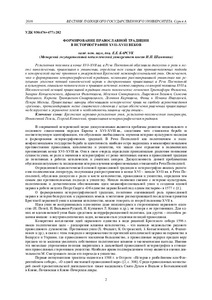Please use this identifier to cite or link to this item:
https://elib.psu.by/handle/123456789/17791Full metadata record
| DC Field | Value | Language |
|---|---|---|
| dc.contributor.author | Барсук, Е. Е. | - |
| dc.date.accessioned | 2016-11-23T12:20:17Z | - |
| dc.date.available | 2016-11-23T12:20:17Z | - |
| dc.date.issued | 2016 | - |
| dc.identifier.citation | Вестник Полоцкого государственного университета. Серия A, Гуманитарные науки. - 2016. - № 9. – C. 2-6. | ru_RU |
| dc.identifier.issn | 2070-1608 | - |
| dc.identifier.uri | https://elib.psu.by/handle/123456789/17791 | - |
| dc.description | Formation of Orthodox Tradition in the Historiography of the Xvii-Xviii Centuries E. Barsuk | ru_RU |
| dc.description.abstract | Религиозная полемика в конце XVI–XVII вв. в Речи Посполитой обусловила дискуссии о роли и месте католичества, православия и униатства, определив тем самым два противоположных подхода к исторической оценке принятия и утверждения Брестской межконфессиональной унии. Отмечается, что о формировании историографической традиции, негативно рассматривавшей униатство как результат усиления позиций католической церкви и дискриминации православных в Речи Посполитой в культурном, социально-политическом и правовом аспектах можно говорить со второй половины XVII в. Идеологической основой православной традиции стали полемические сочинения Христофора Филалета, Захарии Копыстенского, Афанасия Филипповича, Мелетия Смотрицкого, Лаврентия Зизания, Симеона Полоцкого, Кирилла Транквилион-Ставровецкого, Леонтия Карповича, Фомы и Игната Иявлевичей, Петра Могилы. Православные авторы обосновывали исторические права на свободу вероисповедания «русинов», пропагандировали тезис славянского единства с целью обеспечения равенства православных на белорусских и украинских землях и необходимость защиты «веры отцов».= Religious polemics at the end of the XVI–XVII centuries in the Polish-Lithuanian Commonwealth (Rzech Pospolita) caused discussions about the role of Catholic, Orthodox and Uniate Churches, having determined two opposite approaches to historical assessment of acceptance and approval of the Brest interfaith union. The formation of historiographic tradition of negative assessment of uniate church as a result of strengthening the position of Catholicism and discriminating Orthodoxy in the Polish-Lithuanian Commonwealth culturally, socially, politically and judiciary can be traced from the second half of the XVII century. Hristofor Filalet, Zachariah Kopystensky, Afanasy Filippovich, Meletiya Smotritsky, Lavrenti Zizaniya, Simeon Polotsky, Kirill Trankvilion-Stavrovetsky, Leonti Karpovich, Foma and Ignat Iyavlevichey, Pyotr Mogila's polemic compositions became ideological basis of orthodox tradition. Orthodox authors proved historical rights for freedom of religion of "Russinians", propagandized the thesis of Slavic unity for the purpose of ensuring equality of Orthodox Christians on the Belarusian and Ukrainian lands and the need of protection of "belief of fathers". | ru_RU |
| dc.language.iso | ru | ru_RU |
| dc.publisher | Полоцкий государственный университет | ru_RU |
| dc.relation.ispartof | Веснік Полацкага дзяржаўнага ўніверсітэта. Серыя А, Гуманітарныя навук | be_BE |
| dc.relation.ispartof | Herald of Polotsk State University Series A, Humanity sciences | en_EN |
| dc.relation.ispartof | Вестник Полоцкого государственного университета. Серия A, Гуманитарные науки | ru_RU |
| dc.relation.ispartofseries | Серия A, Гуманитарные науки;2016. - № 9 | - |
| dc.rights | open access | ru_RU |
| dc.subject | Брестская церковно-религиозная уния | ru_RU |
| dc.subject | религиозно-полемическая литература | ru_RU |
| dc.subject | Иннокентий Гизель | ru_RU |
| dc.subject | Георгий Конисский | ru_RU |
| dc.subject | православная историографическая традиция | ru_RU |
| dc.subject | Brest church and religious union | ru_RU |
| dc.subject | religious and polemic literature | ru_RU |
| dc.subject | Innokenti Gizel | ru_RU |
| dc.subject | Georgy Konissky | ru_RU |
| dc.subject | orthodox historiographic tradition | ru_RU |
| dc.title | Формирование православной традиции в историографии XVII–XVIII веков | ru_RU |
| dc.type | Article | ru_RU |
| dc.identifier.udc | 930(476+477):282 | - |
| Appears in Collections: | 2016, № 9 | |
Items in DSpace are protected by copyright, with all rights reserved, unless otherwise indicated.
